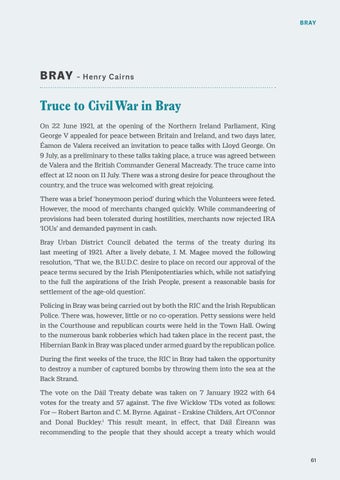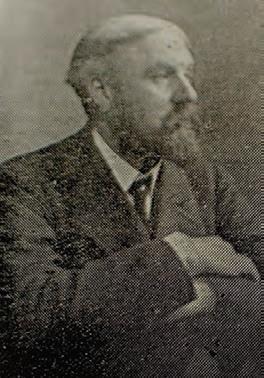BRAY
BRAY
– Henry Cairns
Truce to Civil War in Bray On 22 June 1921, at the opening of the Northern Ireland Parliament, King George V appealed for peace between Britain and Ireland, and two days later, Éamon de Valera received an invitation to peace talks with Lloyd George. On 9 July, as a preliminary to these talks taking place, a truce was agreed between de Valera and the British Commander General Macready. The truce came into effect at 12 noon on 11 July. There was a strong desire for peace throughout the country, and the truce was welcomed with great rejoicing. There was a brief ‘honeymoon period’ during which the Volunteers were feted. However, the mood of merchants changed quickly. While commandeering of provisions had been tolerated during hostilities, merchants now rejected IRA ‘IOUs’ and demanded payment in cash. Bray Urban District Council debated the terms of the treaty during its last meeting of 1921. After a lively debate, J. M. Magee moved the following resolution, ‘That we, the B.U.D.C. desire to place on record our approval of the peace terms secured by the Irish Plenipotentiaries which, while not satisfying to the full the aspirations of the Irish People, present a reasonable basis for settlement of the age-old question’. Policing in Bray was being carried out by both the RIC and the Irish Republican Police. There was, however, little or no co-operation. Petty sessions were held in the Courthouse and republican courts were held in the Town Hall. Owing to the numerous bank robberies which had taken place in the recent past, the Hibernian Bank in Bray was placed under armed guard by the republican police. During the first weeks of the truce, the RIC in Bray had taken the opportunity to destroy a number of captured bombs by throwing them into the sea at the Back Strand. The vote on the Dáil Treaty debate was taken on 7 January 1922 with 64 votes for the treaty and 57 against. The five Wicklow TDs voted as follows: For — Robert Barton and C. M. Byrne. Against – Erskine Childers, Art O’Connor and Donal Buckley.1 This result meant, in effect, that Dáil Éireann was recommending to the people that they should accept a treaty which would
61




























